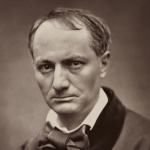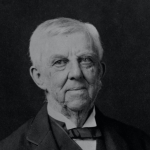All seas are seas in the moon to these
lonely and full of light.
High above laundries and rooftops
the pinstriped silhouettes speak nightmare
as do the faces full of fire and orange peel.
Every citizen knows what’s the trouble: America’s longest
river is—New York; that’s what they say, and I say so.
Wonderful thing, electricity,
all these neon and nylons spun dry by a dime
in the Fifth Street Laundromat. The city
must be flying a thousand kites tonight
with its thousands of different keys.
—Sir, excuse me, sir?
Excuse me interfering, but you don’t want
to put that in—it’s got a rubber backing, see? Oh, not at all . . .
Piles of workshirts, piles of leopard underthings,
it’s like fishing upside down all night long, and then the moon rises
like armfuls of thready sleeves. Her voice
rising and falling, her boys folded sideways asleep on the bench:
—Listen, that old West indian cleaning lady?
Ask anyone here, she never has change.
Come on, she’s too wise . . .
Down in the Tombs
the prisoner’s knuckles climb like stripes
of paint in the light. He dreams he hears
the voice of a pig he used to slop for his uncles.
It pokes its head
through the bars and says
“Have you brought any beet greens?”
—You can never leave them alone at night. Like today
the stitching overseer says to me
If you can’t keep the rhythm missus . . .
I say to him fire
me all you want, I don’t take that shit
off anybody. That was a scare though—
you can’t always get back on a day shift.
In the moonlight
the city rides serenely enough, its thousand light moorings
the hunted news in their eyes. Even the rivers
are tidal, as sailors and bankers know.
The glass bank of the Chase Manhattan stands dark
over the Harbor. One last
light slowly moving around the top floor.
—No washing machines in the basement, that’s
what’s the trouble. The laundry would dry overnight
on the roof, in the wind. Well a month ago
you know, some big boys took this twelveyearold
little Spanish girl up there. Then they killed her, they
threw her, six stories down. Listen, the stone age or something
running around on those roofs. So this cop said to me
Your street is the bottom, he actually
said that to me. So what could I say—that it’s great?
On the folding table the same
gestures repeat, smoothing and folding
the same ancient shirt. Or the old West Indian cleaning lady
pretending to finger her pocket for change. At midnight she’ll prop
her grey spaghetti mop and glide toward you
in her black cotton trousers, her black
lavender face tilted up. Very clearly
she says to the world in dream-language
I mean to live.





















Comment form: